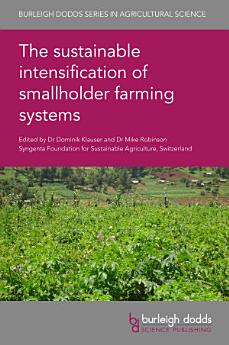The sustainable intensification of smallholder farming systems
Om den här e-boken
Due to a lack of understanding of the constraints they face, many projects developed to support smallholders fail with low adoption rates and limited improvements in livelihoods and food security. Greater emphasis must be placed upon successfully supporting smallholder farmers and their farming systems.
The sustainable intensification of smallholder farming systems provides a comprehensive review of recent research on effective support measures to improve the livelihoods of smallholders in sub-Saharan Africa. This collection features detailed discussions on ways to improve access to key resources, such as seeds, tools and expertise for soil health improvement and integrated pest management (IPM) programmes. A part dedicated to finance and information assesses the need to improve support systems, including farmer organisations and commercial extension services, for the benefit of particular groups of smallholders, e.g. female farmers.
Based on a wealth of practical experience from leading experts in the field, The sustainable intensification of smallholder farming systems will be a standard reference on how best to target support for smallholders to achieve real improvements in their livelihoods. It will be essential reading for university and other researchers studying smallholder farming systems in departments of agricultural science, international development, politics and development economics. It will also be a key reference for government and non-governmental organisations (NGOs) involved in development programmes focussing on smallholders, particularly in sub-Saharan Africa.
Om författaren
Dr Dominik Klauser is a Senior Program Officer at the Syngenta Foundation for Sustainable Agriculture (SFSA) which supports resource-poor small farmers in developing countries. Dr Klauser works on identifying and scaling solutions that benefit the sustainable intensification of smallholder farming systems, such as new crop varieties, seed technologies and sustainable agronomic practices.
Dr Mike Robinson is Chief Science Advisor the Syngenta Foundation for Sustainable Agriculture (SFSA). He was formerly a Senior Technology Analyst for the Syngenta Corporate Strategy and Technology Group and has extensive experience of managing global collaborative research projects between the public and private sectors in bioscience.
Professor John Derera is the Head of Breeding at the International Institute of Tropical Agriculture (IITA). He was formerly Global Head of R&D at Seed Co Group and Professor of Plant Breeding, at the African Centre for Crop Improvement, University of KwaZulu-Natal, in South Africa. He has researched extensively on crop stress tolerance, weevil and aflatoxin resistance, bio-fortification, seed systems and germplasm enhancement. His achievements include numerous publications, graduated many PhD & MSc students, and a recipient of Africa’s 20 Most Influential Plant Breeders Award by SAPBA.
Joyce Gikera is the Supply Chain and Operations Manager at Qualibasic Seed Company. She has over 10 years of experience in seed and agrochemical supply chain, project management, process improvement and quality management with vast knowledge of business trade across East and Southern Africa.







